
Main Page
Alphabetical Menu
Chronological Menu
|
Fading of the Cries 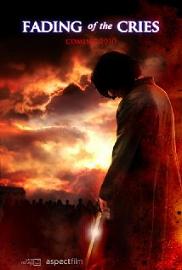 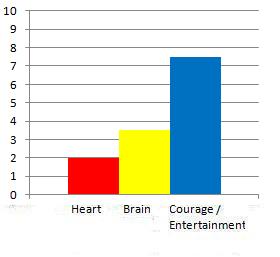 Farmageddon 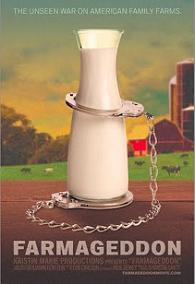 This alarming and heartbreaking documentary focuses on how U.S. government, particularly the USDA and FDA, have been unfairly raiding small farms while being more lenient on commercial farmers. The tactics they use are the kind that you'd expect to find in a police state, not a democracy. Through interviews with many experts and small farmers, namely, Joel Salatin, director Kristin Canty shows how small farms are vital and valuable source of healthy, sustainable foods. The footages of our government officials raiding the small farms with loaded guns feel frightening, and, as it should, will cause you to feel engraged. Admittedly, some of the interviews tend to get a bit repetitive as they drive the point home about how our government intimidates and tries to shut down the business of small farmers without rhyme or reason, but, when it comes down to it, important messages need to be repeated. It'd be interesting to ponder why food and drugs are regulated by the same administration (the FDA). How are there no conflicts of interest within the FDA, USDA and congress? How can anyone rely our government, or even on congress, given their conflicts of interest? For those of you in disbelief that the U.S. government could intentionally harm its own citizens, please look through history to name ONE society with a secret prison system whose government DID NOT eventually turn against its own people. Farmageddon at least raises your awareness of our government's use of fascist tactics and harmful, unfair policies so that, perhaps one day, you'll feel enough outraged enough to start a protest and revolution for the sake of something that's too often taken for granted each day: evolution. 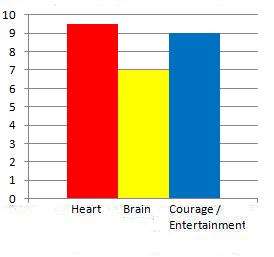 Project Nim 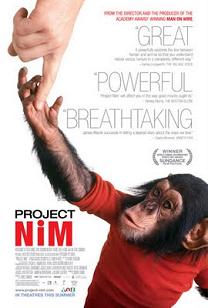 This captivating, heartfelt and brilliantly-edited documentary follows the journey of a chimpanzee, Nim Chimpsky, as heís separated in the early 1970s from his mother at research center in Oklahoma so that graduate student of biology Stephanie LaFarge, per the request of her former behavioral psychologist Herbert Terrace, could raise him like a child in her New York City where she lives with her husband and seven kids. The goal of the experiment is to prove that apes could in fact communicate with humans if they were raised and nurtured like a human. Nim moves in with Stephanie at the age of merely two weeks old, but as her professor candidly admits to the camera, she wasnít properly trained in how to raise an ape. So, Laura-Ann Pettito, an undergraduate student and lab assistant, arrives to help raise the ape and to teach him sign language. She persuades LaFarge to move Nim to a quieter environment in an upstate New York home. If you think that the story of Nim sounds sweet and heartwarming, think again because, as it turns out, Nim suffers from trauma that gradually rises to the surface through his violent behavior. He shows hatred toward Stephanieís husband and ripped part of the face of one of his teachers. Director James Marsh, whoís well-known for his brilliant award-winning documentary Man on Wire, doesnít shy away from the horrors of Nim behavior and the painful results of his trauma, so donít expect this to be a family-friendly film at all. Marsh combines provocative, illuminating interviews with archival footage as well as reenactment scenes that keep you at the edge of your seat as feel increasingly heartbroken by what transpires to Nim. Itís endlessly fascinating to observe how Nim learns how to use sign language to communicate what he wants, whether itís a banana or a blunt. The paradox lies in the fact that the professor wants him to be raised like a human being, yet Nim is fundamentally still an ape no matter how your try to anthropomorphize him. Is it natural and ethical for him to be trained to communicate with humans? That question is up for debate. Whatís certain, though, is that itís inhumane for Nim to be studied in a place like LEMSIP, a medical research facility, which he briefly ends up in. Youíll probably find yourself teary-eyed and angry at LEMSIP as Nimís trainers desperately try to get him out of that horrifying facility. As youíve probably noticed by now, Project Nim, much like any truly great documentary, becomes so interesting and genuinely moving that you often forget that itís a documentary despite its many talking heads; itís a film thatís rich in both form andcontent. Marsh has found the right balance between entertaining the audience and provoking them emotionally as well as intellectually. That balance is so delicate that itís rare and refreshing to find it achieved so successfully here. At a running time of 1 hour and 33 minutes, Project Nim is yet another captivating, heartfelt, provocative and stylishly edited documentary from the brilliant James Marsh. 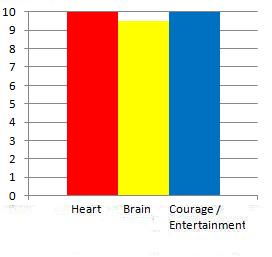 Sholem Aleichem: Laughing in the Darkness 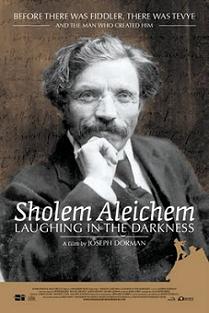 Solomon Naumovich Rabinovich, born in 1859 in the shtetl of Voronko in Russia, has been well-known for writing Yiddish stories, both in the form of novels and plays. He grew up in a Hassidic family, and his father was a wealthy merchant, but soon steep financial loses sunk the family into poverty. Despite that temporary adversity, Solomon continued to write in Yiddish under the pseudonym ďSholem Aleichem,Ē and encouraged other Yiddish writers to publish their works along with him, thereby significantly helping to keep the Yiddish language and culture alive. He soon married the young daughter, Lyalya Kaufman, of a wealthy man. Many of you might know of Sholem Aleichem for writing the stories of Tevye the dairy man which later turned into the classic film Fiddler on the Roof. Director Joseph Dorman deftly incorporates talking heads and well-chosen archival footage in such a way thatís lively, engaging and revealing. This isnít merely the kind of documentary youíd find on Bravo, although it does certainly honor Sholem Aleichem. What distinguishes it from a cut-and-dry honorary documentary is that it provides the complete, non-sugarcoated background information about Sholem and his struggles as a writer. Knowledgeable interviewees, such as Aaron Lansky of the National Yiddish Book Center, David Roskies of the Jewish Theological Seminary, Ruth Wisse, professor of Yiddish Literature at Harvard, and Bel Kaufman, Sholemís granddaughter, articulately analyze Sholemís writings to explain their significance as well as what makes them autobiographical. Why does Sholem Aleichem matter? Why have his writings flourished to this very day? Those are just a few of the many important questions that the documentary answers thoroughly and compellingly through the many interviews. Moreover, Dorman includes smooth and lively editing that gives the film a sense of style that doesnít go overboard. After all, this isnít one of those documentaries that suffers from style over substance because it has both in adequate supply. At a running time of 1 hour and 33 minutes, Sholem Aleichem: Laughing in the Darkness manages to be a simultaneously fascinating, captivating, thorough and insightful documentary. 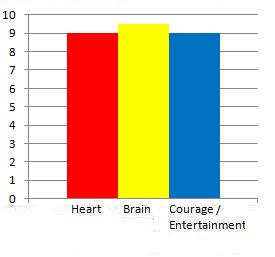 The Ward  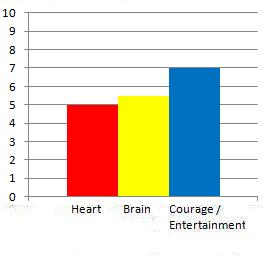 Main Page Alphabetical Menu Chronological Menu ______________________________________________________ |
The NYC Movie Guru
themovieguru101@yahoo.com
Privacy Policy